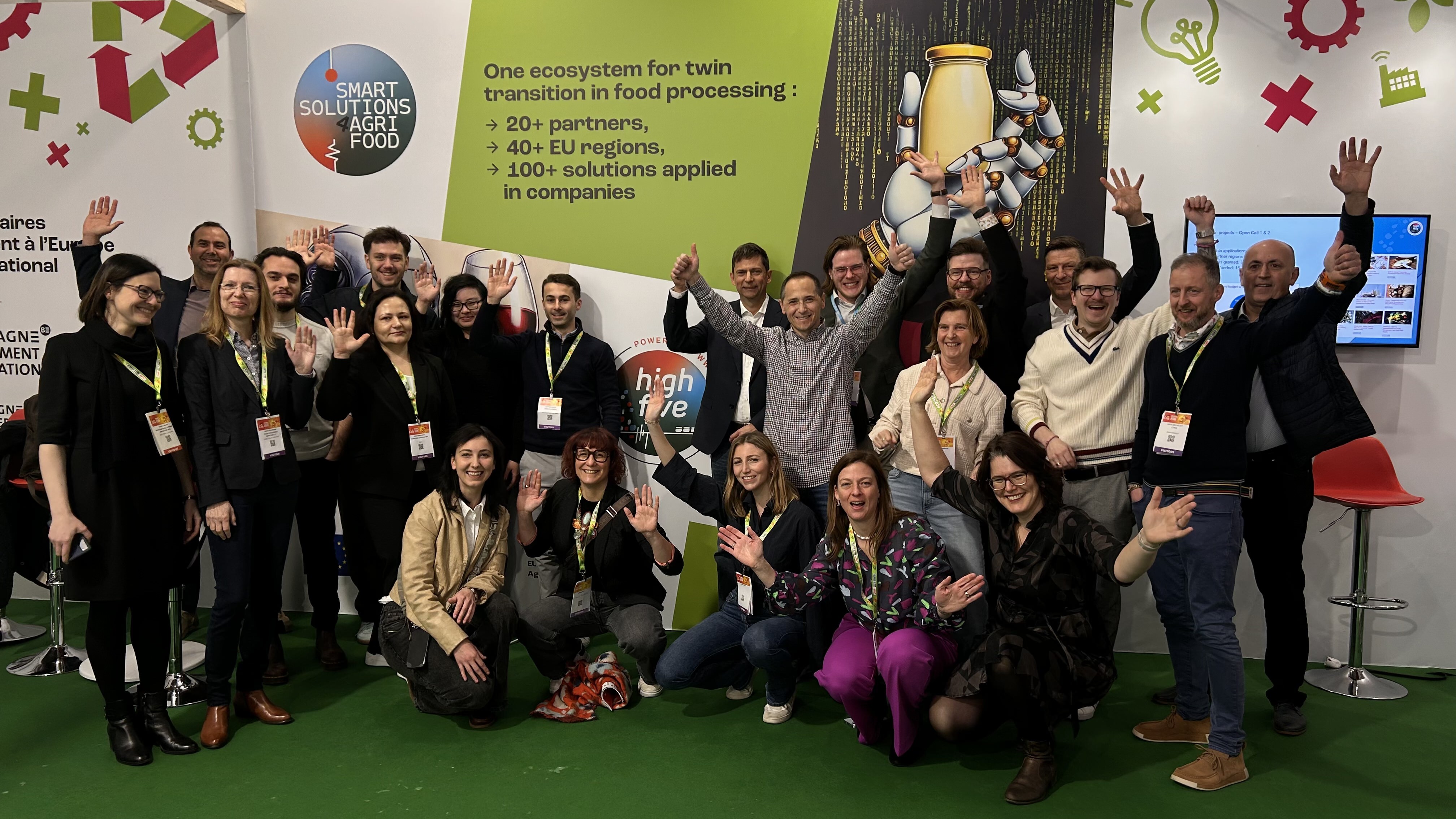HIGHFIVE at CFIA Rennes: Shaping the Future of Food Processing

The CFIA Rennes 2025 expo once again demonstrated its role as a key platform for driving technological advancements in the agrifood sector. Set in the heart of Bretagne, a region renowned for its strong agricultural and food processing industries, the event brought together industry leaders, SMEs, and innovators to explore the future of food production. HIGHFIVE played a pivotal role, presenting breakthrough AI-driven solutions, fostering collaboration, and showcasing real-world applications of digital transformation in food manufacturing.
Strategic Discussions and Collaborative Roadmap
The event opened with the HIGHFIVE Steering Committee Meeting, where project partners assessed progress, explored new opportunities for collaboration, and reinforced strategies for advancing European innovation in the food sector. The afternoon was dedicated to the SS4AF Steering Committee Meeting, further strengthening alignment on digitalisation initiatives. The day concluded with a networking dinner, offering participants the chance to deepen connections and exchange insights in an informal setting.
Bringing Innovation to Life at CFIA Rennes
At Hall 6, “Usine Agro du Futur”, HIGHFIVE led three major activities: SME Pitches, Walk, Connect & Learn Guided Tours, and the AGORA Panel Discussion. These sessions provided a platform for knowledge exchange, real-world demonstrations, and expert-led discussions on the transformative role of AI and automation in agrifood.
SME Pitches: AI-Powered Efficiency and Sustainability
A selection of forward-thinking SMEs presented groundbreaking AI and machine learning solutions, illustrating how data-driven technologies can revolutionise food production:
Smart AI Orchestrator (Metronik & Mlekarna Celeia): Implementing AI-driven resource optimization in dairy production has led to a 7% reduction in energy consumption and a 15% improvement in production planning accuracy. The MePIS Energy and MES system, with its 47 installed meters, has provided real-time insights into energy usage, allowing for more precise adjustments and waste reduction.
PREVAI Project (Quescrem, Spain): The AI-based demand forecasting tool has improved forecasting accuracy by 25%, enabling better raw material procurement, reducing overproduction, and cutting storage costs by 12%. The integration of AI into production scheduling has also led to a 10% reduction in product lead time, improving overall efficiency.
Recycling of Packaging in the Bottled Beverage Industry (BMV & BENCO, Lithuania): By using AI-powered computer vision for real-time defect detection, the project has achieved a 30% reduction in defective packaging, preventing mislabeled and underfilled products from reaching the market. This has translated into an estimated 10% increase in turnover, along with significant cost savings in labor and materials.
- Yazzoom (Belgium):
Beer production monitoring: AI-based water and energy consumption detection at Brewery De Brabandere has identified anomalies leading to a 5% reduction in water waste and a 4% improvement in energy efficiency.
Puree production: Predictive analytics for dry matter content has improved consistency and reduced material losses by 8%.
Hashbrown quality control: Automated visual defect detection has cut down manual inspection time by 40%, increasing overall production speed and minimizing defective product output.
VWW & MBP: Hands-Free Food Production: The development of food-grade mobile robots has addressed labor shortages by automating repetitive tasks, resulting in a 30% increase in productivity. The robots have successfully taken over manual tasks such as bread handling, dosing, and spraying, reducing worker strain and improving hygiene compliance.
AGORA Panel Discussion: Strengthening European Collaboration for Agrifood Innovation
One of the highlights of the event was the AGORA Panel Discussion, which brought together a distinguished panel of experts to explore the role of EU-funded initiatives in fostering innovation and resilience in the agrifood sector. Moderated by Simon Maas, Chief Internationalization Officer at AgriFood Capital, the discussion featured:
Chiara Zanasi – European Projects Manager, Bretagne Développement Innovation (BDI)
David Verstraeten – Engineering Manager & Partner, Yazzoom
Dr. Rok Preseren – Industrial IoT Expert, Metronik
Simon Maas – Chief Internationalization Officer, AgriFood Capital
Simona Diškevičiūtė – New Product Development Manager, Birštonas Mineral Waters
Veerle De Graef – Programme Manager, Flanders' FOOD
The discussion highlighted the crucial role of cross-border collaboration in accelerating the adoption of technological innovations among SMEs. Panelists examined how EU-funded projects like HIGHFIVE serve as a critical support mechanism for SMEs, providing essential funding, expert knowledge, and access to valuable networking opportunities.
Case studies from participating SMEs showcased the tangible benefits of AI-driven digital solutions, demonstrating improvements in food production efficiency, sustainability, and overall competitiveness. The conversation also delved into the common challenges faced by SMEs in scaling up AI and automation, with insights on how innovation ecosystems can provide the necessary support structures to facilitate this transition.
Exploring the Future of Agrifood Technology
The final day was dedicated to in-depth industry engagement, including walking tours, networking opportunities, and a visit to GELDELIS in Torcé, a leader in quiche and tart production. These sessions provided participants with a firsthand look at how innovation is shaping the future of food manufacturing.
A Collective Effort to Drive Transformation
HIGHFIVE’s presence at CFIA Rennes 2025 highlighted the transformative power of AI, automation, and digitalisation in making food production more efficient, sustainable, and competitive. By fostering collaboration between industry stakeholders, SMEs, and research institutions, the project continues to pave the way for a smarter, more resilient agrifood sector.
